Caribbean
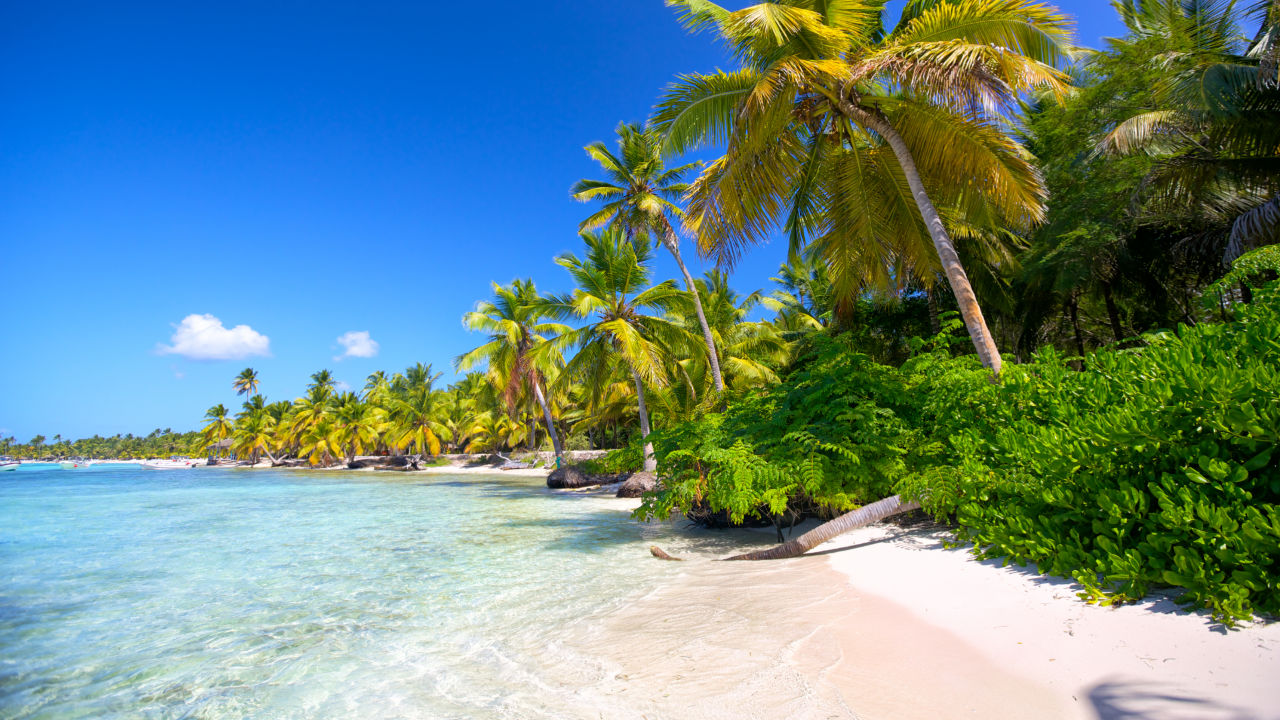
Travel to the Caribbean is a captivating journey into a realm where azure waves gently kiss the sun-kissed shores, and vibrant coral reefs teem with life beneath the surface, painting the underwater world in vivid hues of purple, blue, and gold. The intoxicating aroma of rich, spicy jerk chicken mingles with the sweet scent of fresh coconuts, inviting you to indulge your senses. As you stroll through colorful markets, the infectious rhythm of reggae fills the air, urging your feet to move in time with the unmistakable beat. Lush rainforests offer a symphony of nature's own making, with the whispers of palm leaves swaying and the melodic calls of exotic birds. More than just a paradise for those seeking sun and sea, the Caribbean offers a diverse tapestry of cultures, each island boasting its unique heritage and stories. Whether you're drawn by the allure of hidden waterfalls, the taste of tropical fruits bursting with flavor, or the warmth of hospitality that greets you at every turn, travel to the Caribbean promises a magical escape that transcends beyond mere relaxation, beckoning exploration and discovery. Uncover the endless wonders of the Caribbean, a destination rich with unforgettable experiences waiting to be embraced.
Caribbean Travel Season
When planning a trip to the Caribbean, understanding the best travel season is crucial for making the most of your experience. The peak travel season to the Caribbean typically runs from mid-December to mid-April. During this time, the weather is most favorable, with warm temperatures and low humidity levels. This period also sees a significant influx of tourists, as many seek to escape the winter chill in their own countries. If you're considering travel to the Caribbean during these months, expect higher prices for accommodations and flights, as well as busier resorts and beaches.
To enjoy the Caribbean with pleasant weather and smaller crowds, consider visiting during the shoulder seasons, which occur from late April to early June and from late November to mid-December. These periods offer a sweet spot where the weather remains relatively dry and temperatures warm, yet the crowds have dispersed. This can be the ideal time for those seeking a blend of comfort and tranquility while avoiding the peak travel rush. Travelers can take advantage of more affordable rates and shorter queues at attractions, allowing for a more relaxed exploration of the Caribbean.
Off-Peak Travel and Hurricane Season Considerations
The off-peak season in the Caribbean runs from June to November, coinciding with the Atlantic hurricane season. While some may be hesitant to travel to the Caribbean during this time, there are distinct advantages. Many islands offer significant discounts on travel packages, and the natural beauty is just as captivating, albeit with increased humidity and the risk of rain. Sometimes, rain showers are short-lived, often followed by sunshine, making it possible to still enjoy outdoor activities. Moreover, travelers who venture to the Caribbean during these months can experience local culture more intimately, as the lighter tourist traffic allows for deeper engagements with the local people and traditions.
Local Events and Festivities
Traveling to the Caribbean at various times of the year opens the door to experiencing an array of local events and festivities. For example, Carnival, which usually takes place between February and March, is celebrated with exuberant parades, music, and dance across many islands. Attending Carnival offers an opportunity to witness the vibrant culture and heritage of the Caribbean firsthand. Other notable events include Independence Day celebrations on different islands, where visitors can enjoy unique displays of national pride, complete with festive events and local culinary delights.
Whether choosing to travel to the Caribbean during peak, shoulder, or off-peak seasons, there are plenty of experiences to be enjoyed. While the peak season offers ideal weather conditions, the shoulder and off-peak seasons present opportunities to explore the region at a more relaxed pace and at better value. Regardless of the time of visit, the Caribbean offers a wealth of natural beauty, cultural richness, and adventure-ready landscapes awaiting exploration.
The Weather and Seasons in Caribbean
The Caribbean is renowned for its warm tropical climate that draws travelers from around the globe, creating a year-round paradise perfect for vacation. When you choose to travel to the Caribbean, you can expect generally warm temperatures and a welcoming atmosphere that varies slightly throughout the year.
Seasons and Temperature
The Caribbean climate is primarily characterized by two main seasons: the dry season and the wet season. The dry season, which spans from December to April, is a particularly attractive time for tourists. During this period, temperatures generally hover between 75°F to 85°F (24°C to 29°C), making it the most pleasant time for travelers seeking sun and outdoor activities. Many visitors consider this the ideal time to travel to the Caribbean, as humidity is lower, providing comfortable conditions to enjoy the stunning beaches and vibrant local culture.
The wet season, from May to November, brings more tropical rain showers, with temperatures ranging from 78°F to 88°F (26°C to 31°C). Although rain is more frequent, showers are often short-lived and typically followed by sunshine, continuing the Caribbean's tradition of warm weather. During this time, the humidity can be higher, which might be less comfortable for some travelers. However, this season also represents the Caribbean's off-peak travel period, offering the allure of fewer crowds and potentially lower travel costs.
Rainfall and Humidity
Rainfall in the Caribbean varies significantly across the islands, influenced by factors such as topography and geographical location. Islands closer to South America like Trinidad and Tobago experience rainier conditions compared to those further north. The average annual rainfall is around 40-70 inches depending on the location, with peaks during the hurricane season, which officially runs from June to November.
Humidity remains relatively steady throughout the year, with higher levels during the wet season. While this can result in a more tropical, sticky feel, the constant ocean breeze provides a natural cooling effect, helping to maintain comfortable conditions for visitors.
Best Time to Travel
The optimal time to travel to the Caribbean largely depends on personal preference regarding climate and travel budget. For those in search of the best weather conditions, the dry season from December to April is recommended, where travelers can witness the Caribbean at its most vibrant. This period also aligns with numerous local festivals and events that offer an immersive cultural experience. However, those willing to embrace a bit of rainfall can enjoy the benefits of traveling during the wet season, including reduced prices on accommodations and flights, along with a more tranquil atmosphere.
Seasonal Events
Many islands host unique events and festivals throughout the year, offering cultural richness tied to the season. Carnival is one of the most celebrated events, particularly in Trinidad and Tobago, usually taking place before Lent during the dry season, drawing travelers worldwide to experience its lively music, dance, and parades. Moreover, the wet season offers its own unique charm with harvest festivals and quieter tourist hotspots.
No matter what time of year you choose to travel to the Caribbean, the alluring combination of its warm climate, beautiful landscapes, and rich cultural activities provide an unforgettable travel experience. Whether you're drawn by the bustling festivities of the dry season or the serene beauty of a tropical shower, the Caribbean promises adventure at every turn.
Accepted Payment Methods and Other Payment Information in Caribbean
When planning travel to the Caribbean, understanding the payment options available can enhance your travel experience significantly. The Caribbean, a diverse region rich in culture and beauty, has varied currency systems that correspond to the individual islands. Many Caribbean countries use the East Caribbean Dollar (XCD), while others have their own currencies such as the Jamaican Dollar (JMD), the Bahamian Dollar (BSD), the Barbadian Dollar (BBD), or the Trinidad and Tobago Dollar (TTD). U.S. Dollars are widely accepted across the Caribbean, especially in tourist-friendly areas, making it convenient for travelers from the United States.
Credit card usage in the Caribbean is generally robust, though it can vary depending on the island and even the specific area within the island. Visa and Mastercard are typically accepted across major Caribbean destinations, providing flexibility and ease of transactions for travelers. American Express is also accepted, albeit to a lesser extent, with some merchants and restaurants opting not to accept it due to higher transaction fees. Discover cardholders should take note that Discover is less widely accepted in the Caribbean compared to Visa and Mastercard. Thus, it's crucial for tourists relying on credit cards to carry multiple forms or enquire beforehand.
Besides credit cards, cash remains an essential aspect of the financial landscape in the Caribbean. Many smaller establishments, local markets, and street vendors might prefer or only accept cash. When paying with cash in the Caribbean, it is advisable to carry smaller denominations to avoid request for change, which can sometimes be a hassle in less urban areas. ATMs are readily available in urban centers and airports, but travelers should be prepared for occasional connectivity issues, which can be common on some islands.
Tipping Etiquette in the Caribbean
Tipping is customary in the Caribbean, and while it is not always obligatory, it is appreciated. In restaurants, a tip of 10-15% is standard if a service charge hasn’t already been added to the bill. For hotel staff, such as porters and housekeepers, tips may range from $1 to $5 depending on the service. Taxi drivers typically expect a tip of about 10% of the fare. It's always a good idea for travelers to confirm if service charges are included before adding an additional tip.
When traveling to the Caribbean, ensuring a smooth payment process will enhance your travel experience. Always verify with your bank about the foreign transaction fees if you plan to use a credit card. Mobile payments and digital wallets are gradually gaining traction but are not yet universally accepted in most Caribbean countries. Understanding these nuances will enable travelers to navigate financial transactions seamlessly during their travel to the Caribbean, enjoying the beautiful sights without unnecessary worries.
Why You Should Travel to Caribbean
When envisioning an idyllic getaway, travelers often dream of pristine beaches, vibrant cultures, and unique experiences. Travel to the Caribbean, and you'll find all these dreams come to life amidst the region's stunning natural landscapes and rich cultural tapestry.
Heavenly Beaches
The Caribbean boasts some of the most enchanting beaches in the world, where travelers can lose themselves in the serenity and beauty of crystal-clear turquoise waters and powdery white sands. Each island offers its own unique beach experience, whether it's the pink sands of Bermuda, the palm-fringed shores of Aruba, or the secluded coves of Anguilla. The breathtaking seascapes provide the perfect backdrop for a relaxing sunbathing session, adventurous water sports, or simply a quiet escape.
Vibrant Marine Life
Travel to the Caribbean and dive into a world teeming with marine wonders. Snorkeling and scuba diving enthusiasts can explore some of the planet's most extraordinary coral reefs. From the spectacular underwater formations of Belize's Great Blue Hole to the vibrant marine ecosystems in the Bahamas, the Caribbean Sea offers an unparalleled opportunity to swim alongside colorful fish, graceful manta rays, and gentle sea turtles.
Cultural Richness and Diversity
The Caribbean is a cultural mosaic, shaped by its indigenous peoples, African heritage, and European colonial influences. Visitors can immerse themselves in a rich tapestry of languages, traditions, and music. Each island offers distinct cultural experiences, from the reggae rhythms of Jamaica to the salsa beats of Cuba and the steelpan music of Trinidad and Tobago. Enjoy Caribbean festivals like Carnival, where the colorful parades and lively dances are a feast for the senses.
Historical Significance
For history buffs, travel to the Caribbean offers a journey through time. The region is home to numerous historical sites and landmarks that tell the story of its colonial past and the resilience of its people. Walk the cobblestone streets of Old San Juan in Puerto Rico, explore the historic plantations of Barbados, or visit the Citadelle Laferrière in Haiti, a UNESCO World Heritage site that stands as a testament to the island's successful slave rebellion.
Ecotourism Adventures
Nature lovers and adventure seekers will find a paradise of ecotourism opportunities in the Caribbean. Hike the lush trails of Dominica's rainforests, explore the natural beauty of the Blue Mountains in Jamaica, or kayak through the luminous bioluminescent bays of Puerto Rico. The region's national parks and nature reserves provide travelers with a unique chance to connect with diverse flora and fauna.
Exquisite Cuisine
The culinary landscape of the Caribbean is as diverse as its culture. From spicy jerk chicken in Jamaica to the savory roti of Trinidad and Tobago, Caribbean cuisine is a delectable fusion of flavors and influences from around the world. The region's tropical fruits, fresh seafood, and traditional spices create an unforgettable dining experience that satisfies every traveler's taste buds.
Warm Hospitality and Relaxed Atmosphere
The Caribbean is renowned for its warm hospitality and laid-back lifestyle. The locals, known for their friendly and welcoming nature, make visitors feel right at home as soon as they set foot on the islands. Travelers can unwind and embrace the slower pace of life, where the most pressing task is deciding between lounging by the beach or sipping a cocktail as the sun sets on the horizon.
Stunning Sunsets
Sunset in the Caribbean is a spectacular display of colors that sets the sky ablaze and creates a perfect romantic atmosphere. Island destinations such as Aruba, Grenada, and Saint Lucia offer some of the most picturesque sunset vistas. Travelers can enjoy this awe-inspiring natural phenomenon from seaside bars, remote beaches, or on a sunset cruise, making it an unforgettable part of any Caribbean experience.
Luxurious Resorts and Overwater Bungalows
The Caribbean is home to some of the world's most luxurious resorts and exclusive overwater bungalows. These accommodations offer a perfect blend of opulence and privacy, where visitors can enjoy world-class amenities, spa treatments, and personalized services. With stunning sea views from private balconies, infinity pools, and direct access to the ocean, these lavish retreats provide a dreamlike escape for discerning travelers.
Year-Round Destination
Travel to the Caribbean year-round and experience the region's consistently warm climate and long sunny days. While many destinations face seasonal fluctuations, the Caribbean remains inviting throughout the year. With its tropical breezes and steady temperatures, the Caribbean is the perfect escape from cold weather, allowing visitors to soak up the sun any time they choose to plan their adventure.
The History of Caribbean
The Caribbean is a region steeped in a rich tapestry of history that beckons travelers from around the globe. As you travel to the Caribbean, you immerse yourself in a land where the ancient meets the modern, and cultural influences merge seamlessly. The Caribbean's past is marked by the legacy of indigenous cultures, European colonization, and the transatlantic slave trade. These historic events have woven a multicultural fabric that is both complex and captivating. With its lush landscapes and azure seas, the Caribbean is not just a tropical paradise but also a historical gem waiting to be explored.
Historic landmarks and sites across the Caribbean offer invaluable glimpses into its storied past. Sites like Castillo San Felipe del Morro in Puerto Rico and the historic district of Old Havana in Cuba stand as testaments to colonial architectural prowess and strategic military engineering. As you travel to the Caribbean, visiting these landmarks provides insights into the struggles and triumphs of the colonial era. Further exploration can take you to places like the ancient petroglyphs in St. Vincent and the Grenadines, which reflect the life and beliefs of the region's earliest inhabitants. These areas not only highlight the Caribbean's diverse history but also offer a tangible connection to its rich cultural heritage.
Culture in the Caribbean is a captivating mélange that has developed over centuries of dynamic change and resilience. The influence of African, European, and indigenous Taíno cultures can be seen in the region's art, music, and culinary traditions. Music festivals celebrating reggae, calypso, and salsa vibrant with life are frequent, as is Caribbean cuisine, which tantalizes the palate with flavors reflecting its diverse roots and storied history. When you travel to the Caribbean, engaging with its cultural expressions enriches your experience and understanding of how history has shaped the vibrant contemporary identity of the islands.
For history lovers and cultural enthusiasts, the Caribbean represents a compelling travel destination that offers more than just stunning beaches. It is a land where the past informs the present in ways that few other regions can boast. Whether marveling at historical architecture, exploring ancient ruins, or partaking in rich cultural traditions and festivals, the Caribbean holds ample opportunities for an enriching journey through time. Travel to the Caribbean expands beyond relaxation and adventure, offering a chance to engage with a compelling narrative that continues to shape its identity and allure visitors in search of deeper connections to the world's history.
The Culture of Caribbean
The Caribbean is a wondrous mosaic of cultures that captivates the hearts of travelers with its vibrant traditions and welcoming people. When you travel to Caribbean islands, you are greeted with a lively blend of customs that are rooted in the region's complex history and diverse heritage. The Caribbean is a melting pot, influenced by the indigenous Amerindian tribes, European colonial powers, African cultural practices brought by enslaved peoples, and more recent influxes of Asian communities. Each island offers a unique cultural tapestry, yet they are united by a shared sense of rhythm, color, and communal celebration. This makes travel to Caribbean islands an enchanting experience where every day reveals a new dimension of cultural richness.
A highlight for many visitors is the dynamic festivals that punctuate the Caribbean calendar. Events such as Trinidad and Tobago's Carnival, Barbados's Crop Over, and Jamaica's Reggae Sumfest are world-renowned. These festivals are more than just parties; they are expressions of identity and community spirit. Vibrant costumes, pulsating music, and the joyous mingling of locals and visitors create an immersive experience that captures the essence of the Caribbean's joie de vivre. The opportunity to partake in these celebrations is a compelling reason to travel to Caribbean destinations, as they allow you to witness and participate in the exuberance and freedom that define the region’s cultural atmosphere.
Daily customs and traditional practices provide travelers with a window into the Caribbean's soul. Family gatherings revolve around shared meals, where the cuisine reflects a fusion of flavors from various cultural influences. Experiences like savoring a meal of jerk chicken in Jamaica or enjoying a robust bowl of callaloo in St. Lucia are culinary adventures that tell stories of the islands’ past and present. Furthermore, the Caribbean's strong emphasis on community and hospitality ensures that travelers are not just observers but are often invited to join in these local customs. Whether it's participating in a spontaneous street dance or a lively cricket match, immersing yourself in the everyday life of the islands is a rewarding aspect of travel to Caribbean locales.
Art, music, and dance are profound cultural expressions that permeate life in the Caribbean. The infectious rhythms of reggae, calypso, soca, and the recently popularized dancehall music echo through the streets, creating a constant backdrop to the islands. Meanwhile, traditional dances such as the Cuban rumba and the Puerto Rican bomba express stories and emotions that words cannot fully capture. Art in the Caribbean often reflects the vibrant colors of the landscape and the resilience of its people, with influences ranging from indigenous designs to African, European, and Asian motifs. The blend of these artistic expressions creates a unique cultural canvas that invites travelers to appreciate the innovative spirit of the Caribbean. Visitors are often drawn to galleries, museums, and street murals that showcase the region's artistic talent, each telling a part of the Caribbean's multifaceted story.
The Culinary Experience of Caribbean
Travel to the Caribbean offers a vibrant and diverse culinary experience that truly reflects the region's rich tapestry of cultures and traditions. With influences from African, European, Indigenous, and South Asian cuisines, Caribbean dishes are a tantalizing mix of flavors and spices. As you explore the beautiful islands, from Jamaica to Trinidad and Tobago, you’ll find a wealth of local ingredients, seafood, and tropical fruits that form the backbone of Caribbean food. This cuisine is not just about sustenance but a celebration of the islands' history and cultural melting pot, making every meal an exploration of the region's unique personality.
When you travel to the Caribbean, don’t miss out on sampling some of the must-try dishes scattered across the islands. Dive into the spicy world of jerk chicken in Jamaica, a dish marinated with a blend of local spices and cooked over pimento wood. In Barbados, the flying fish paired with cou-cou, a cornmeal-based dish, is a traditional favorite. Trinidad’s doubles—delicious fried dough filled with curried chickpeas—are perfect for food enthusiasts and those seeking street food adventures. Each island offers its specialties, such as a savory conch fritters in the Bahamas or the hearty goat water stew in Montserrat. These dishes connect travelers with the essence of Caribbean culture through their bold and authentic flavors.
The beverage scene in the Caribbean is just as vibrant as the food, with local beers like Red Stripe from Jamaica or Carib from Trinidad being popular choices to pair with meals. The romance of Caribbean rum is impossible to ignore—the islands boast some of the best distilleries in the world. Travelers can enjoy locally-crafted spirits such as Mount Gay from Barbados or Appleton Estate from Jamaica. Fruit-infused cocktails like the Painkiller or the Planter's Punch showcase fresh tropical ingredients and local spirits, offering a refreshing taste of island life. Local wines made from tropical grapes and fruits also provide a unique sampling opportunity for wine lovers.
Food markets and festivals provide some of the most vibrant dining experiences when traveling to the Caribbean. Visit the bustling markets of Kingston or Bridgetown to savor street food and interact with local vendors. The Caribbean is also home to numerous food festivals, such as the St. Lucia Food and Rum Festival or Jamaica's Jerk Festival, where visitors can indulge in seasonal dishes, watch cooking demonstrations, and enjoy live entertainment. For those with dietary preferences, many islands offer a range of options, with numerous vegan and vegetarian-friendly restaurants embracing local produce. These inclusive culinary offerings ensure that every traveler can immerse themselves in the unique and flavorful world of Caribbean cuisine.
What to See and Do in Caribbean
The Caribbean offers a vibrant and diverse travel experience, drawing visitors with its stunning beaches, rich culture, and adventure opportunities. Whether you're traveling solo, with family, or seeking thrills, the Caribbean presents unique experiences for every traveler.
St. Lucia's Pitons: A Hiker’s Dream
For adventure seekers, hiking the majestic Pitons is an experience not to be missed when you travel to the Caribbean. These iconic volcanic peaks provide challenging trails with breathtaking views of the surrounding island and ocean. Whether scaling Gros Piton or the steeper Petit Piton, hikers are rewarded with a deep sense of accomplishment and an unparalleled panorama that captures the allure of the Caribbean's diverse landscape.
The Cultural Tapestry of Havana, Cuba
Experience a rich cultural immersion in Havana, a city buzzing with music, dance, and history. Wander through the cobblestone streets of Old Havana, a UNESCO World Heritage Site, where classic cars line the roads and vibrant buildings tell a story of past colonial times. Engage with locals at a traditional salsa club or sample authentic Cuban cuisine. Havana is a testament to the Caribbean's complex identity and is a must-visit for those traveling to the Caribbean with a love for culture.
The Mesmerizing Cenotes of the Yucatán Peninsula
The Yucatán Peninsula, though traditionally more aligned with Central America, offers a hidden gem of the Caribbean with its enchanting cenotes. These natural sinkholes, filled with crystal-clear water, provide a surreal snorkeling and diving experience that feels like entering a hidden paradise. With light filtering through stalactites into the deep blue water, cenotes offer an otherworldly adventure perfect for travelers seeking both tranquility and excitement.
Exploring Pirates’ History in Nassau, Bahamas
Families, history buffs, and pirate enthusiasts will enjoy Nassau's infamous Pirate Museum. The museum brings to life the Caribbean's colonial past, where Nassau served as a pirate haven. Interactive exhibits and lifelike pirate ship recreations offer a fun learning experience about the infamous figures who once roamed the Caribbean seas. It's an entertaining way to connect with the historic tales that define much of the Caribbean's colorful lore.
Rum Tasting in Barbados: A Spirited Journey
Barbados is considered the birthplace of rum, and no trip to the Caribbean is complete without a visit to its renowned distilleries. Participate in a guided tour at Mount Gay Distillery, the world’s oldest rum distillery, to learn about the rum-making process and taste a variety of their finest spirits. This experience provides a unique cultural insight into this integral part of Caribbean heritage, making it a rich experience for gourmet enthusiasts and history lovers alike.
Swimming with Rays in Stingray City, Cayman Islands
At Stingray City in the Cayman Islands, travelers can enjoy a once-in-a-lifetime encounter with friendly stingrays in their natural habitat. Wade through knee-deep, crystal-clear waters as these gentle giants glide around you, creating an unforgettable interactive experience. It's a perfect activity for families and solo adventurers who seek a close-up interaction with Caribbean marine life, ensuring memories that will last a lifetime.
The Vibrant Nightlife of San Juan, Puerto Rico
San Juan offers a dynamic nightlife that perfectly encapsulates the lively spirit of the Caribbean. From beachfront clubs and salsa lounges to cozy bars tucked within the historic district, there's a venue for every taste. Visitors can dance the night away to reggaeton beats or enjoy local rum cocktails, making San Juan a top destination for travelers looking to experience the Caribbean's upbeat nightlife.
Discovering Mayan Ruins at Tulum, Mexico
Travelers with a penchant for history will find the ancient Mayan ruins of Tulum an awe-inspiring destination. Positioned on a dramatic clifftop overlooking the Caribbean Sea, the site offers both remarkable history and stunning vistas. Walking through Tulum, visitors can explore well-preserved structures dating back to the pre-Columbian era, making it an essential stop for those embarking on a journey through the cultural heritage of the Caribbean and surrounding region.
Relaxing on Grace Bay Beach, Turks and Caicos
For those seeking relaxation, Grace Bay Beach offers one of the world's most beautiful and serene shorelines. The shimmering turquoise waters and powdery white sands create a peaceful haven ideal for unwinding. Whether sunbathing, swimming, or sipping a cocktail at a beachfront bar, Grace Bay Beach epitomizes the leisurely lifestyle of the Caribbean, providing a picturesque escape for every traveler.
Whale Watching in Samana, Dominican Republic
From mid-January to late March, the Samana Peninsula becomes home to one of the Caribbean's most magnificent natural spectacles: the mating and birthing of humpback whales. Guided boat tours lead travelers to observe these majestic creatures in action, providing an awe-inspiring view into the life cycle of whales amidst the lush Caribbean backdrop. This extraordinary wildlife experience is a highlight for nature lovers and families visiting the Caribbean during these months.
Tips & Tricks for Traveling in Caribbean
Traveling to the Caribbean can be an unforgettable experience with its turquoise waters, lush landscapes, and vibrant cultures. By following these practical travel tips, your time in the Caribbean will be more enjoyable, stress-free, and immersive.
Know the Best Time to Travel to the Caribbean
When planning travel to the Caribbean, consider the climate and peak travel seasons. The high travel season usually runs from December to April, when the weather is cooler and drier. However, visiting during the shoulder seasons – May to June and September to November – can result in better deals on accommodation and fewer crowds. Just be mindful of the hurricane season, which peaks in September and October, and always check the weather forecasts and travel advisories.
Explore Local Markets
Travel to the Caribbean is incomplete without exploring the lively local markets. These bustling hubs are perfect for immersing yourself in the local culture, tasting fresh produce, and picking up handmade crafts and souvenirs. Places like the Grand Anse Spice Market in Grenada or the Straw Market in Nassau, Bahamas offer a rich experience. Remember to carry local currency, as many vendors may not accept cards, and don’t shy away from friendly bargaining.
Embrace Island-Hopping
One of the best ways to maximize your Caribbean travel experience is through island-hopping. The Caribbean is a tapestry of diverse islands, each with unique cultures, cuisines, and landscapes. Ferries and short flights make it easy to travel between destinations like St. Vincent and the Grenadines or the US and British Virgin Islands. Plan your routes in advance and check ferry or flight schedules to make the most of your island-hopping adventure.
Learn Basic Local Phrases
While English is widely spoken in many Caribbean islands, locals appreciate visitors who make an effort to speak basic phrases in the local languages or dialects. Whether it’s French in Martinique, Spanish in the Dominican Republic, or Papiamento in Aruba, learning greetings or thank-yous can enhance your interactions and show respect for the local culture during your Caribbean travels.
Use Local Transportation Options
To really dive into the Caribbean lifestyle, consider using local transportation like buses or shared taxis known as “route taxis.” Not only do these options provide budget-friendly transportation, but they also offer insight into daily life and opportunities to meet residents. Routes and schedules may vary, so ask locals or hotel staff for advice on how to navigate transport during your travels in the Caribbean.
Enjoy Traditional Caribbean Cuisine
Culinary exploration is a must for anyone planning travel to the Caribbean. Each island boasts its own signature dishes, such as Jamaica’s jerk chicken, St. Lucia’s green fig and saltfish, or Barbados’ flying fish and cou-cou. Visit local lunch spots or night markets to sample authentic Caribbean flavors, and don’t miss the chance to try street food stands that deliver delicious meals at great prices.
Respect the Beach Etiquette
Caribbean beaches are world-renowned, and enjoying them respectfully is essential. Always clean up after yourself, respect private beach areas, and be mindful of local customs, such as nude beaches in some areas. Some beaches may be nesting grounds for endangered species, and adhering to regulations helps protect the environment. Be courteous to vendors but feel free to politely decline if you're not interested in their products.
Visit Less Tourist-Centric Locations
Beyond the famed tourist attractions, lesser-known spots offer authentic experiences. Engage with locals to discover hidden gems, such as secluded beaches, hiking trails, or charming small towns outside the usual tourism circuits. Travel to the Caribbean isn’t just about the well-trodden paths; these off-the-beaten-path locales provide insights into the region’s real character and are often less crowded and more laid-back.
Create a Flexible Itinerary
While it’s good to plan, maintaining flexibility can be crucial during travel to the Caribbean. Weather conditions, ferry schedules, or local events might require you to adjust your itinerary. Allow room for spontaneity, whether it’s staying an extra day at a favorite spot or attending an unexpected local festival. Embracing flexibility can lead to some of the most memorable travel experiences in the Caribbean.
Take Travel Insurance Seriously
No matter how careful you are, unexpected issues can arise during travel to the Caribbean. Comprehensive travel insurance covers unforeseen circumstances such as medical emergencies, trip cancellations, or loss of belongings. Given the region’s susceptibility to weather changes, particularly during hurricane season, securing a robust insurance policy is a wise investment for peace of mind.
What To Know Before You Go to Caribbean
When planning your travel to the Caribbean, it's essential to be aware of entry requirements, as they can vary significantly from one island to another. Many Caribbean countries require a valid passport for entry, and some also require a visa. Always check with the specific country's consulate website to see if a visa is necessary for your stay. Additionally, certain islands may require travelers to be vaccinated against diseases like yellow fever if they are arriving from affected areas, so it's wise to verify any vaccination requirements in advance.
Local Customs and Etiquette
Understanding local customs and etiquette is critical when you travel to the Caribbean. Caribbean cultures are a mix of indigenous, African, European, and South Asian influences. It’s important to be respectful of these diverse customs. Greetings are typically more formal, with a handshake and a polite "Good morning" or "Good afternoon." Dress standards can vary, but modesty is appreciated, especially in rural areas and places of worship. Keeping noise levels down in public spaces is courteous, as is asking for permission before taking photos, especially of people.
Transportation Options
Travelers have several transportation options when exploring the Caribbean. Renting a car is a popular choice, providing flexibility to explore the islands at your own pace. However, remember that driving is on the left side of the road in some islands like Jamaica and Barbados. Taxis are widely available, but it's advisable to agree on a fare before starting your journey, as meters are not always used. Public transportation, such as buses and minibusses, is another viable option, although it may be less reliable. Several islands also offer ferry services, which can be a scenic way to travel between destinations.
Tipping Culture
Tipping is a customary practice in the Caribbean, and it often reflects the quality of service received. In restaurants, a tip of 10-15% is generally expected, unless a service charge is included in the bill. Hotel staff, taxi drivers, and tour guides also appreciate a small gratuity for good service, typically around $1-2 for porters and a higher percentage for exceptional taxi service. Always check the local customs, as tipping practices can vary from island to island.
Common Phrases
While English is widely spoken throughout the Caribbean, especially in tourist areas, knowing a few local phrases can enrich your experience and show respect for the culture. In French-speaking regions like Martinique or Guadeloupe, simple phrases such as "Merci" (thank you) or "Bonjour" (hello) are appreciated. Similarly, in Spanish-speaking Puerto Rico or the Dominican Republic, phrases like "Gracias" (thank you) and "Hola" (hello) are useful. Learning a few words in the local Creole dialect can also enhance interactions with locals.
Health Precautions
Travel to the Caribbean requires some health precautions to ensure a safe and enjoyable trip. It's vital to consider vaccinations for diseases such as hepatitis A and B, typhoid, and rabies, depending on the regions you'll visit. Mosquito-borne illnesses like dengue fever and Zika virus can be a concern, so using insect repellent and covering up with clothing can reduce risk. Travel insurance is strongly advised, covering medical emergencies and unforeseen circumstances. Be mindful of local food and water safety, opting for bottled water where necessary, and practicing good hygiene.
Communication Tips
Effective communication enhances your travel experience in the Caribbean. While English is commonly spoken, some islands have their own languages, such as French, Spanish, or Creole, which vary in dialect. Using translation apps can be very helpful for non-native speakers. Speak clearly and at a moderate pace if language barriers arise, and remember that a friendly smile can go a long way. Familiarizing yourself with local expressions can demonstrate cultural sensitivity and may win you warmer interactions.
Accessibility in Caribbean
The Caribbean is a popular travel destination for people from around the world, offering stunning beaches, vibrant culture, and diverse landscapes. For travelers with specific needs, including those who require physical accessibility, travel to the Caribbean can still be a fulfilling experience, thanks to ongoing efforts to improve accessibility across the islands. Both tourists with limited mobility who use wheelchairs and those needing visual or auditory accommodations can find options to enhance their travel experiences.
Physical Accessibility for Travelers with Limited Mobility
When planning travel to the Caribbean, it's essential to assess the physical accessibility of different destinations, as infrastructure varies widely across the region. In recent years, major islands like Barbados, the Bahamas, and Jamaica have made strides in improving accessibility. Many resorts and hotels are now built or renovated with ramps, elevators, and ADA-compliant rooms to accommodate travelers using wheelchairs. It's advisable to contact accommodations directly to verify specific amenities.
Visual and Auditory Accommodations
While the Caribbean is gaining ground in terms of physical accessibility, visual and auditory accommodations are still developing. However, some high-end hotels and resorts offer services such as tactile or braille signage and auditory signals. Travelers with hearing impairments can also request assistive listening devices at various tourist attractions. It is recommended for travelers with visual or auditory needs to contact individual hotels or service providers before travel to the Caribbean to inquire about the accommodations available.
Accessible Public Transportation
Public transportation varies greatly between Caribbean islands. Larger islands like Puerto Rico have made efforts to improve the accessibility of their public transportation systems. In San Juan, for example, tourists can find buses and trains that cater to travelers with wheelchairs. However, on smaller islands, accessible transportation options may be limited, making renting a vehicle with hand controls a necessary consideration for some travelers. Some tour operators offer accessible shuttles, especially near tourist-centric areas.
Accessible Tourist Attractions
Numerous tourist attractions in the Caribbean have adopted measures to accommodate travelers with different needs. The Dunn's River Falls in Jamaica offers viewing platforms that are wheelchair accessible, allowing visitors to enjoy the captivating scenery without difficulty. Additionally, the UNESCO-listed forts in Puerto Rico provide ramps and exhibits designed for all audiences. Several beaches throughout the Caribbean have introduced beach wheelchairs to assist travelers in enjoying the sun and sand.
When planning travel to the Caribbean, it's crucial for travelers with specific needs to conduct thorough research and plan ahead. Though progress is ongoing, knowing which islands and accommodations offer accessible features can lead to a more enjoyable and hassle-free travel experience. With the Caribbean's natural beauty waiting to be explored, continuous improvements in accessibility ensure that all travelers can share in its wonders.
Health & Safety in Caribbean
The Caribbean is a popular region for travelers, known for its stunning beaches, vibrant culture, and rich history. However, like any travel destination, it is essential for visitors to be aware of specific safety concerns while traveling to the Caribbean. Understanding potential risks can help ensure a safe and enjoyable trip.
Water Safety
Water safety is an important consideration for those traveling to the Caribbean. The region's crystal-clear waters are inviting for swimming, snorkeling, and other water-related activities. However, travelers should be aware of strong currents, riptides, and unexpected weather changes. It's advisable to swim at beaches patrolled by lifeguards and to heed local advisories about sea conditions. Additionally, while tap water is potable in some Caribbean countries, it's recommended to drink bottled water to avoid stomach upset, especially in less developed areas.
Natural Disaster Risks
The Caribbean is prone to natural disasters, particularly hurricanes. The hurricane season typically runs from June to November, which can affect travel plans and safety in the area. Travelers should stay informed about weather forecasts and have an emergency plan in case of severe weather. It's crucial to follow the guidance of local authorities during such events. Earthquakes are less frequent but can occur, necessitating awareness of basic earthquake safety procedures.
Crime: Pickpocketing and Theft
Certain areas in the Caribbean have higher crime rates than others, and tourists can be targets for petty theft or pickpocketing. To reduce the risk of becoming a victim, travelers should avoid displaying wealth, stay in well-populated and well-lit areas, and secure their belongings, especially in crowded places. It's wise to use hotel safes for valuables and to remain cautious when using ATMs. While violent crime against tourists is less common, it's advisable to stay informed about which areas to avoid.
Political and Social Unrest
While most Caribbean nations are politically stable, occasional protests or demonstrations can occur. These are usually peaceful but can disrupt travel plans. Before traveling, it's a good idea to consult travel advisories from relevant government sources to understand any potential areas of unrest. Staying informed and avoiding participation in political gatherings are prudent strategies for safety.
Health and Safety Precautions
Travelers to the Caribbean should be aware of potential health concerns and necessary precautions. Some areas may require vaccinations, such as Hepatitis A, Hepatitis B, or Typhoid, particularly if staying in less tourist-heavy locations. Mosquito-borne illnesses like dengue fever and the Zika virus can also be concerns; using insect repellent and wearing protective clothing can mitigate these risks. Access to healthcare varies throughout the region, with more developed islands offering better facilities than remote areas. It's beneficial to have travel insurance that covers healthcare needs and potential evacuation.
Other Places You Might Like
Amalfi Coast, Italy - The spectacular Amalfi Coast provides a perfect travel experience akin to the Caribbean with its breathtaking coastal views and romantic Mediterranean vibe. The coastline is dotted with picturesque towns like Positano and Ravello, where you can enjoy crystal-clear waters and charming beaches reminiscent of those in the Caribbean. The vibrant blue of the Tyrrhenian Sea matched by the coastal cliffs offers travelers stunning scenery that dazzles the senses. Culinary enthusiasts will appreciate the fresh seafood and exquisite Italian cuisine, while hikers will enjoy trails like the Path of the Gods, offering panoramic views that rival Caribbean vistas.
Great Barrier Reef, Australia - For those who love the marine life and underwater adventures found in the Caribbean, a travel trip to the Great Barrier Reef is a must. This natural wonder, stretching over 1,400 miles, is the world's largest coral reef system and offers incredible snorkeling and diving experiences. The vibrant corals and variety of marine species, including colorful fish, turtles, and even whales, provide an unparalleled underwater spectacle. Travelers seeking to explore awe-inspiring aquatic landscapes will find the Great Barrier Reef a captivating alternative to Caribbean waters.
Phuket, Thailand - Known for its stunning beaches and vibrant nightlife, a travel destination like Phuket offers a cultural twist to the tropical paradise often enjoyed in the Caribbean. The crystal-clear waters and palm-lined shores are perfect for those who appreciate the serene beauty of the Caribbean. Moreover, the island boasts unique cultural landmarks like the Big Buddha and Wat Chalong Temple, providing a deeper insight into Thai culture. Travelers can also indulge in the world-renowned Thai cuisine, making it a destination that combines beach relaxation with cultural exploration.
Maui, Hawaii, USA - Maui appeals to Caribbean travel enthusiasts with its diverse landscapes and beautiful beaches. From the lush valleys of the Iao Valley State Park to the iconic Road to Hana, where travelers can witness cascading waterfalls and vibrant rainforests, Maui offers diverse natural beauty. The island's serene beaches are perfect for lounging or water sports, with snorkeling at Molokini Crater providing an experience akin to exploring Caribbean coral reefs. The local Hawaiian culture, with its traditions and culinary offerings, provides a charm and warmth that echo the hospitality of Caribbean islands.
Bora Bora, French Polynesia - Often compared to the Caribbean for its stunning beauty and luxury resorts, Bora Bora is an enticing travel destination for those who enjoy serene island getaways. The turquoise lagoon, coral reefs, and overwater bungalows offer a quintessential tropical escape admired by Caribbean lovers. The island's romantic atmosphere makes it a preferred destination for honeymooners, while its marine life and water activities such as snorkeling and paddling offer experiences similar to those found in the Caribbean. Bora Bora's unique blend of tranquility and adventure caters perfectly to travelers seeking the ultimate island paradise.
Final Thoughts
Imagine stepping into a vibrant mosaic of crystal-clear waters, sun-drenched beaches, and lush landscapes; this is what traveling to the Caribbean promises every visitor. The Caribbean delights with its diverse culture, rich history, and ethereal beauty, making it a must-visit destination for travelers worldwide. Whether you seek relaxation on serene beaches or adventure exploring hidden waterfalls and vibrant coral reefs, the Caribbean offers a myriad of experiences that cater to every traveler's desires.
Travel to the Caribbean and discover the warmth of its people, whose hospitality is as legendary as the region's breathtaking sunsets. From the rhythmic beats of calypso and reggae to the delectable flavors of jerk chicken and fresh seafood, the Caribbean is a sensory feast that stays with you long after your journey concludes. The islands' unique tapestry of colonial and indigenous influences creates an enriching cultural immersion that adds depth to every stay.
As you plan your next adventure, consider a trip to the Caribbean, where each island offers something distinct yet universally captivating. Whether you're drawn to the vibrant nightlife of the Bahamas, the rich heritage of Jamaica, or the peaceful seclusion of the British Virgin Islands, traveling to the Caribbean guarantees a transformative experience filled with unforgettable moments. It's time to explore, rejuvenate, and create memories in this enchanting part of the world.
Anguilla

Antigua

Antigua and Barbuda

Aruba
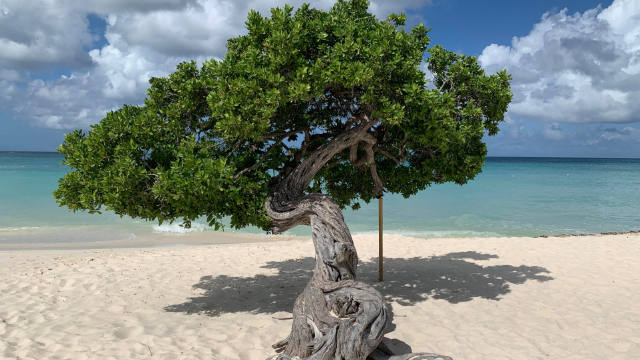
Bahamas
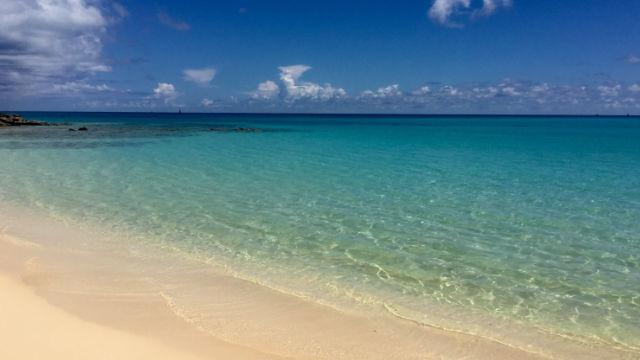
Barbados
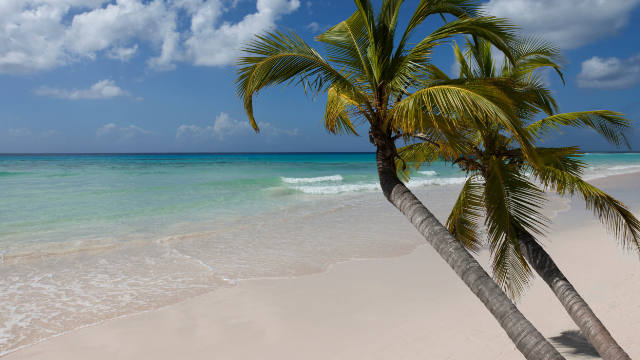
Belize
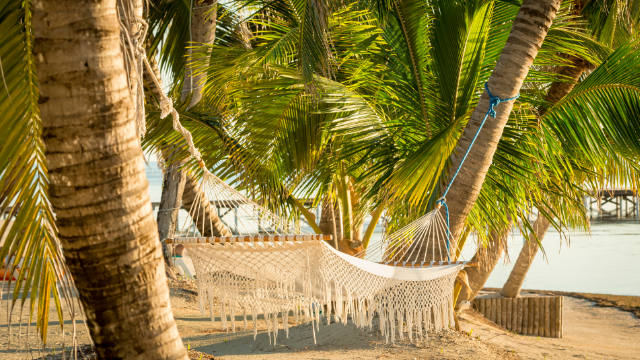
Bermuda
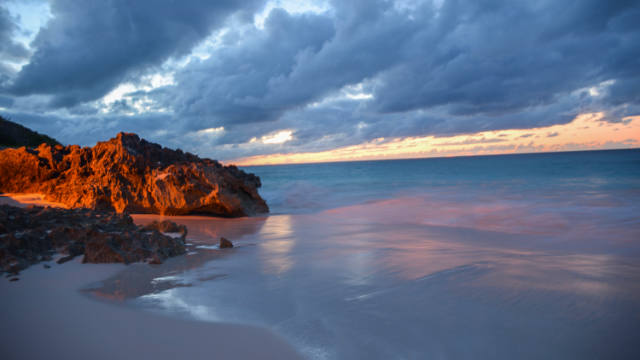
British Virgin Islands

Caymen Islands

Cuba
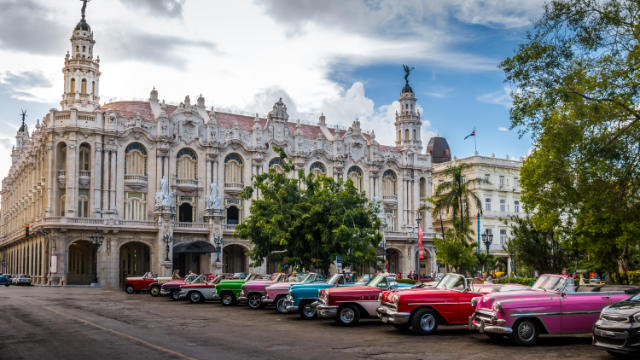
Curaçao

Dominica

Dominican Republic

Granada

Grenada

Haiti

Jamaica
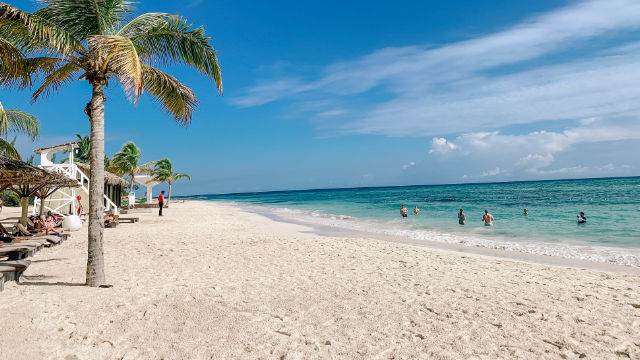
Martinique

Montserrat

Northern Leeward Islands

Saint Barthélemy

Saint Lucia

St. Barthelemy

St. Barts

St. Croix

St. Kitts and Nevis

St. Lucia

St. Maarten

St. Martin

St. Thomas

St. Vincent and the Grenadines

Trinidad and Tobago

Turks and Caicos

Easter Caribbean Cruises: MSC Sailings April 2026

ALG Vacations Hyatt Inclusive Sale, Book By Feb 26

Suiteheart Sale Caribbean Sandals Resorts, Book By Feb 16

JetBlue Vacations BOGO Airfare Deal On Packages

Britannia Itinerary Change, P&O Adds 25% Credit

FAA Caribbean Caution NOTAM Through Feb 2

Caribbean Flash Flood Outlook For Feb And Mar Trips

FAA Mexico, Central America Flight Caution Through March

Hilton Caribbean Resort Sale, Book By Jan 27

Sandals Winter Blues Caribbean Credits, Book by Feb 2

Sargassum Blooms Cost Florida and Puerto Rico Beaches

Venezuela Airspace Advisory, Caribbean Flights, February 2

Winter Blues Sale Caribbean Resorts: Sandals, Beaches

San Juan Cruise Delays After Venezuela Airspace Curbs

Windstar Caribbean Cruise Embarkation Delays After Closures

Venezuela Airspace Curbs Disrupt Caribbean Flights

Venezuela Airspace Warning Disrupts Caribbean Routes

Venezuela Airspace Warning Forces Flight Reroutes

Venezuela Airspace Warning Reroutes Caribbean Flights

2028 World Cruise From Miami To Athens With Azamara

Melissa Cuts Jamaica Rooms, Shifts Dominican Winter Trips

Caribbean disturbance could become Tropical Storm Melissa

Caribbean tropical disturbance may alter late-week cruises

Royalton debuts Royalton Suites & Villas for Diamond Club

Hurricane Gabrielle brings dangerous surf; Narda turns away

